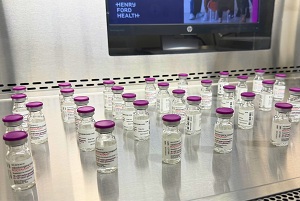Henry Ford Announces $20 Million Gift to Launch the Henry Ford Pancreatic Cancer Center

New $20 million gift that will offer hope in the fight against pancreatic cancer, a devastating disease with a 5-year survival rate of only 8 percent
DETROIT – Henry Ford Health System announced today a new $20 million gift to launch the Henry Ford Pancreatic Cancer Center, which will focus on global collaborations to develop new methods for the early detection of pancreatic cancer – a devastating disease with a 5-year survival rate of only 8 percent.
The gift is made possible by support from an individual donor who wishes to remain anonymous.
This $20 million gift will help to establish partnerships between Henry Ford and leading national and international organizations to identify means to detect pancreatic cancer at an earlier stage, with best-in-class collaborations and technological advancements. As these partnerships are established there is potential for additional financial resources.
“We are grateful for this transformational gift that will allow Henry Ford to bring the best minds in the world together to shine an important light on pancreatic cancer. It marks a crucial step in advancing pancreatic cancer research with the goal of increasing survivorship for patients diagnosed with this terrible disease,” says Wright Lassiter III, President and CEO, Henry Ford Health System.
“While we’ve made incredible advances in cancer diagnosis and treatment, where some types of cancer are now curable, pancreatic cancer remains nearly a universally fatal diagnosis,” says Steven N. Kalkanis, M.D., Medical Director, Henry Ford Cancer Institute, and Chair, Department of Neurosurgery. “One of the challenges is pancreatic cancer is often diagnosed late, generally at an advanced stage, making it difficult to treat. If we are going to move the needle, we need a global crowd-sourced effort to diagnose pancreatic cancer earlier and give patients a fighting chance for survival.”
David Kwon, M.D., Director of Surgical Oncology, Henry Ford Cancer Institute, and Director, Multidisciplinary Pancreas Clinic at Henry Ford Hospital, will help to oversee the Henry Ford Pancreatic Cancer Center. He notes that the scale and opportunity of this global collaboration will provide significant benefit and efficiencies that will change the landscape of pancreatic cancer, through its focus on:
- Expanding the number of identified biomarkers in pancreatic cancer that can be validated in patients diagnosed with pancreatic cancer
- Translating these biomarkers into screening tests to detect pancreatic cancer earlier
- Utilizing artificial intelligence to analyze clinical medical records and radiologic studies to identify previously unidentified patterns in patients’ medical records that may alert providers to the early diagnosis of pancreas cancer
- Developing investigator-initiated clinical trials to advance pancreatic cancer treatment
“Never has there been a greater momentum in the fight against pancreatic cancer, and unfortunately, the incidence of pancreatic cancer will only continue to rise,” says Dr. Kwon. “To effectively fight pancreatic cancer, we need to work to find solutions to problems that have eluded clinicians and researchers to date, while embracing a culture of innovation and collaboration.”
An estimated 53,670 people are diagnosed each year with pancreatic cancer. There is currently no effective screening tool available to diagnose pancreatic cancer early. Most people do not experience any symptoms of pancreatic cancer until the cancer has progressed to an advanced stage.
The $20 million gift will establish the following:
- A Multi-Institutional Pancreatic Consortium, led by Henry Ford. The global consortium will serve to drive the research initiatives with focus on early detection, data analytics, translational research, precision medicine, and clinical trials.
- An endowed director’s fund to support the hiring of a leading pancreatic cancer clinical leader and a research leader for the Henry Ford Pancreatic Cancer Center.
- An endowed fund to establish an administrative director for the Henry Ford Pancreatic Cancer Center.
This gift builds on the tremendous momentum created by Detroit businessman and philanthropist Mort Harris, who donated $20 million to Henry Ford in December 2016 in honor of his late wife, Brigitte, to back the Brigitte Harris Cancer Pavilion in Detroit, opening in 2020. The largest individual gift in Henry Ford’s history, Harris’ donation is part of a $40 million package to support the building project and three specific program areas: precision medicine, brain cancer, and pancreatic cancer, which Brigitte battled for almost two years before she passed away in 2016.
The Fight Against Pancreatic Cancer
These gifts highlight Henry Ford’s strong commitment to advancing cancer research and treatment.
The Henry Ford Cancer Institute’s Precision Medicine program is the first and most comprehensive in Michigan to offer genomic testing and the expertise of a molecular tumor board to all cancer patients. Henry Ford also is among a few select health systems in the country chosen to participate in All of Us, a National Institutes of Health Precision Medicine research program.
Along with its clinical care expertise in pancreatic cancer, Henry Ford is uniquely positioned to leverage these resources to make major headway in the fight against pancreas cancer, says Dr. Kwon.
Building International Partnerships
Henry Ford also is well positioned to nurture and grow international partnerships through this initial $20 million gift for the Henry Ford Pancreatic Cancer Center.
Henry Ford has an extensive global network, including relationships with healthcare leaders, entrepreneurs and investors in Saudi Arabia, India, and, Israel, cultivated by Scott Dulchavsky, M.D., Ph.D., CEO of the Henry Ford Innovation Institute and Chairman of Surgery and Surgeon in Chief at Henry Ford Hospital.
Henry Ford Innovations is responsible for leveraging the health system’s intellectual property to improve the efficiency, quality, and cost of healthcare both locally and globally. Its programs include commercialization of new technology, corporate collaborations, education and training of healthcare innovators, and global licensing including the health system’s “know-how” for the development of new hospitals overseas.
Partnership discussions are underway, and will be announced soon.
Learn more: www.henryford.com/services/pancreatic-cancer/pancreatic-cancer-consortium
About the Henry Ford Cancer Institute
The Henry Ford Cancer Institute is one of the largest cancer programs in Michigan, providing care at five hospitals and six outpatient facilities, and dozens of aligned doctor’s offices throughout southeast Michigan. Treatment for the most complex or rare cancers and the Institute’s extensive cancer research program is anchored by Henry Ford Hospital. For more information, visit www.henryford.com/cancer.
MEDIA CONTACT: Krista Boyer
.svg?iar=0&hash=F6049510E33E4E6D8196C26CCC0A64A4)

/hfh-logo-main--white.svg?iar=0&hash=ED491CBFADFB7670FAE94559C98D7798)









